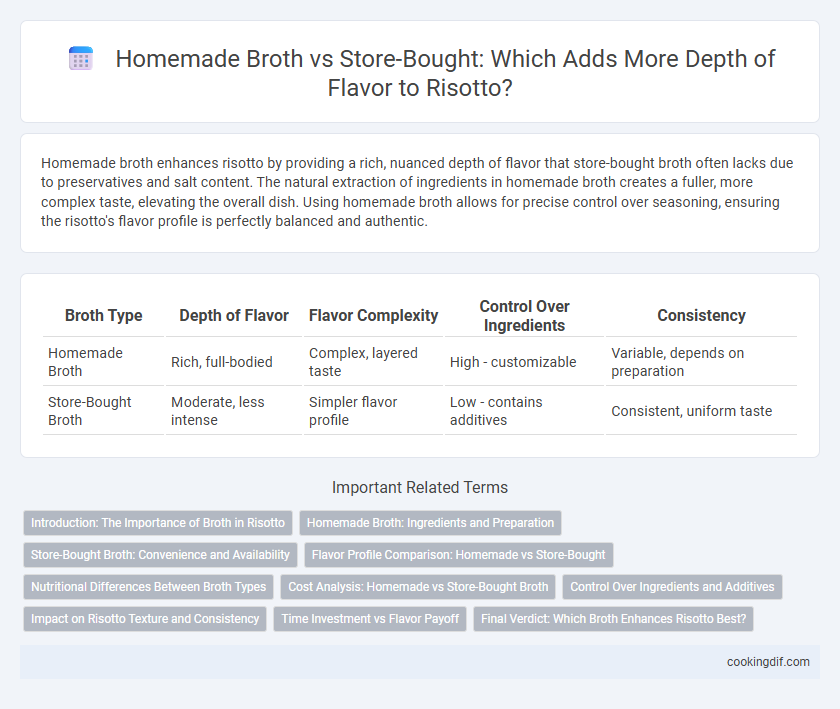Homemade broth enhances risotto by providing a rich, nuanced depth of flavor that store-bought broth often lacks due to preservatives and salt content. The natural extraction of ingredients in homemade broth creates a fuller, more complex taste, elevating the overall dish. Using homemade broth allows for precise control over seasoning, ensuring the risotto's flavor profile is perfectly balanced and authentic.
Table of Comparison
| Broth Type | Depth of Flavor | Flavor Complexity | Control Over Ingredients | Consistency |
|---|---|---|---|---|
| Homemade Broth | Rich, full-bodied | Complex, layered taste | High - customizable | Variable, depends on preparation |
| Store-Bought Broth | Moderate, less intense | Simpler flavor profile | Low - contains additives | Consistent, uniform taste |
Introduction: The Importance of Broth in Risotto
Homemade broth provides rich, layered flavors essential for an authentic risotto experience, thanks to the slow simmering of fresh vegetables, herbs, and bones that extract deep umami notes. Store-bought broth often contains preservatives and lacks the complex taste profile that elevates each grain of Arborio rice. Choosing high-quality broth directly impacts the creamy texture and depth of flavor, making homemade stock the preferred base for a superior risotto.
Homemade Broth: Ingredients and Preparation
Homemade broth for risotto is crafted from fresh ingredients such as chicken bones, vegetables like carrots, celery, and onions, and aromatic herbs including thyme and bay leaves, simmered slowly to extract rich, layered flavors. The preparation involves simmering these components gently over several hours, allowing natural gelatin and nutrients to develop a full-bodied, savory base that enhances the risotto's depth and complexity. This slow-cooked process results in a broth with superior umami notes and a cleaner, more intense taste profile compared to most store-bought options.
Store-Bought Broth: Convenience and Availability
Store-bought broth offers unmatched convenience and consistent availability, making it an ideal choice for quick risotto preparation. While it may lack some complexity compared to homemade broth, many premium brands provide rich, well-balanced flavors enhanced with natural ingredients. Its long shelf life and ease of use streamline the cooking process, allowing chefs to focus on technique and ingredient quality without sacrificing taste.
Flavor Profile Comparison: Homemade vs Store-Bought
Homemade broth offers a richer, more complex flavor profile with natural umami notes extracted from simmered bones, vegetables, and herbs, enhancing risotto's depth and aroma. Store-bought broth often contains added salt and preservatives, resulting in a more uniform but less nuanced taste that can diminish the dish's subtle layers. Using homemade broth allows precise control over seasoning and freshness, yielding a creamier, more vibrant risotto.
Nutritional Differences Between Broth Types
Homemade broth offers superior nutritional benefits compared to store-bought broth, containing higher levels of collagen, gelatin, and essential amino acids that support gut health and joint function. Store-bought broth often contains added sodium, preservatives, and artificial flavors, which can diminish its nutritional quality and overall depth of flavor. Using homemade broth in risotto enhances richness and complexity through natural minerals and nutrients extracted from bones and vegetables during slow simmering.
Cost Analysis: Homemade vs Store-Bought Broth
Homemade broth typically offers richer flavor depth and customizable seasoning, enhancing risotto's taste complexity, though it requires time and ingredient investment which increases its cost. Store-bought broth provides convenience and consistent quality at a lower upfront price, but may contain additives that marginally diminish natural flavor profiles. Evaluating cost efficiency involves comparing the time and fresh ingredients used in homemade broth against the bulk purchasing and shelf life advantages of store-bought options.
Control Over Ingredients and Additives
Homemade broth provides superior control over ingredients, allowing for a rich, pure flavor without unwanted additives or preservatives typically found in store-bought options. This control enhances the risotto's depth of flavor by using fresh herbs, vegetables, and bones or meat tailored to taste preferences. Store-bought broth often contains high sodium levels and artificial flavor enhancers that can overpower delicate risotto flavors.
Impact on Risotto Texture and Consistency
Homemade broth enhances risotto texture and consistency by providing a richer, more balanced flavor profile, which allows the rice to absorb nuanced savory notes and develop a creamier mouthfeel. The natural gelatin and minerals in homemade broth contribute to a smoother, silkier consistency, ensuring each grain of Arborio rice remains tender but distinct. Store-bought broth often contains preservatives and sodium levels that can alter the risotto's final texture, sometimes resulting in a harsher, less cohesive dish.
Time Investment vs Flavor Payoff
Homemade broth provides a richer, more complex flavor for risotto, drawing depth from simmered vegetables, herbs, and bones over several hours. Store-bought broth offers convenience, saving time but often lacks the nuanced taste that enhances the dish's creaminess. Investing time in homemade broth significantly elevates the risotto experience by delivering a fuller, more satisfying flavor payoff.
Final Verdict: Which Broth Enhances Risotto Best?
Homemade broth offers a richer, more complex flavor profile that elevates risotto with its natural depth derived from fresh ingredients and slow simmering. Store-bought broth provides convenience but often lacks the nuanced taste and body essential for authentic, creamy risotto. For the best enhancement in risotto, homemade broth is the superior choice due to its ability to impart robust, layered flavors that intensify the dish's overall taste.
Homemade broth vs store-bought broth for depth of flavor Infographic

 cookingdif.com
cookingdif.com